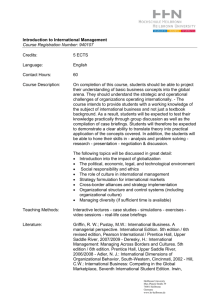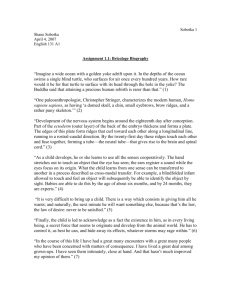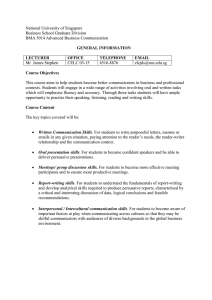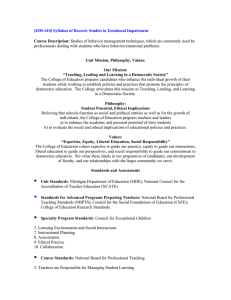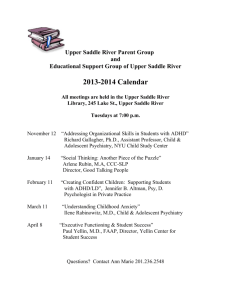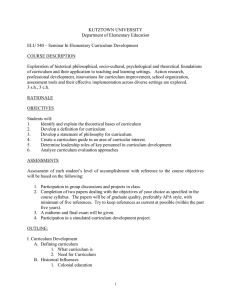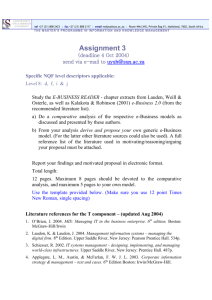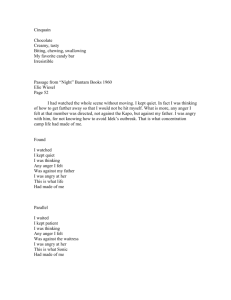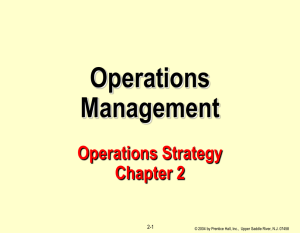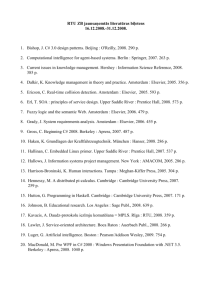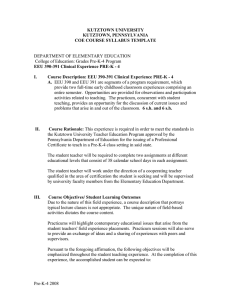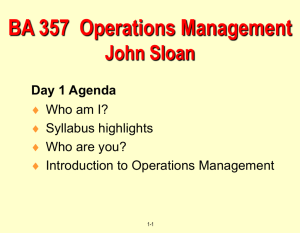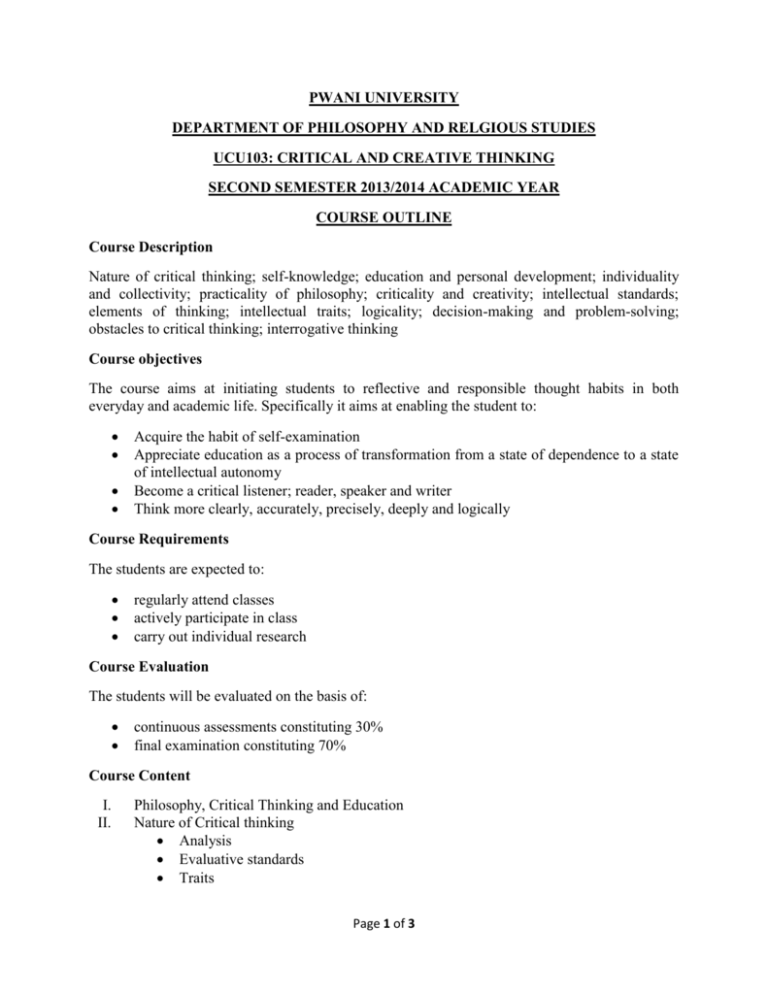
PWANI UNIVERSITY
DEPARTMENT OF PHILOSOPHY AND RELGIOUS STUDIES
UCU103: CRITICAL AND CREATIVE THINKING
SECOND SEMESTER 2013/2014 ACADEMIC YEAR
COURSE OUTLINE
Course Description
Nature of critical thinking; self-knowledge; education and personal development; individuality
and collectivity; practicality of philosophy; criticality and creativity; intellectual standards;
elements of thinking; intellectual traits; logicality; decision-making and problem-solving;
obstacles to critical thinking; interrogative thinking
Course objectives
The course aims at initiating students to reflective and responsible thought habits in both
everyday and academic life. Specifically it aims at enabling the student to:
Acquire the habit of self-examination
Appreciate education as a process of transformation from a state of dependence to a state
of intellectual autonomy
Become a critical listener; reader, speaker and writer
Think more clearly, accurately, precisely, deeply and logically
Course Requirements
The students are expected to:
regularly attend classes
actively participate in class
carry out individual research
Course Evaluation
The students will be evaluated on the basis of:
continuous assessments constituting 30%
final examination constituting 70%
Course Content
I.
II.
Philosophy, Critical Thinking and Education
Nature of Critical thinking
Analysis
Evaluative standards
Traits
Page 1 of 3
III.
IV.
V.
VI.
VII.
VIII.
IX.
Obstacles to critical thinking
Inferential Thinking
Deduction and Induction
Informal Fallacies
Personal-identity and self-knowledge
Autonomy
Appearance and Reality
Interrogative thinking
Creative thinking
Obstacles to Creative thinking
Decision-making
Problem-solving
Individuality and Sociality
Course Facilitators:
Dr. Stephen O. Owino (Office No. 370 New Administration block, 3rd Floor)
Dr. Francis G. Wokabi (Office No. 348 New Administration block, 2nd Floor)
References
Adair, J. (1990). The Art of Creative Thinking. Guildford (England): Talbot Adair
Brookfield, S. (1987). Developing Critical Thinkers. Buckingham: Open
University Press.
Chaffee, J. (1985). Thinking Critically. N. Y.: Houghton Mifflin Company
De Bono, E. (1993). Teach Your Child How to Think. London: Penguin Books
___________ (2000). Six Thinking Hats. London: Penguin Books.
Dewey, J. (1933). How We Think. (Revised Edition) Boston: Heath.
_______ . (1916). Democracy and Education. N.Y.: The Free Press
_______. (1991). How We Think. New York: Prometheuss Books.
Fisher, R. (1990). Teaching Children to Think. London: Basil Blackwell Ltd.
_______. (1998). Teaching Thinking: Philosophical Enquiry in the Classroom.
London: Cassell
Fisher, A. (2001). Critical Thinking: An Introduction. Cambridge:Cambridge University Press.
Lipman, M. (1991). Thinking in Education. N. Y: Cambridge University
Press.
Page 2 of 3
Norris,S. and Ennis,R. (1989). Evaluating Critical Thinking. Pacific Grove, CA:
Critical Thinking Press and Software.
Nosich, G. (2005). Learning to Think Things Through: A Guide to Critical
Thinking Across the Curriculum. Second Edition. Upper Saddle River, N.J.: Pearson
Prentice Hall.
Paul, R. (1995). Critical Thinking: How to Prepare Students for a Rapidly
Changing World. Santa Rosa, CA: Foundation for Critical Thinking
Paul, R. and Elder, L. (2001). Critical Thinking: Tools for Taking Charge of Your
Learning and Your Life. Upper Saddle River, N.J.: Prentice Hall
_______________ (2002). Critical Thinking: Tools for Taking Charge of Your
Professional and Personal Life. Upper Saddle River, N.J.: Financial Times Prentice Hall
_______________ (2006). Critical Thinking: Tools for Taking Charge of Your
Learning and Your Life.2nd Edition. Upper Saddle River, N.J.: Prentice
Hall
Paul, R. Binker, A. Martin, D. and Adamson, K. (1989). Critical Thinking
Handbook: High School: A Guide for Redesigning Instruction. Rohnert Park, CA.: Centre
for Critical Thinking and Moral Critique.
Paul, R., Fisher,A., and Nosich, G. (1993). Workshop on Critical Thinking
Strategies. CA: Foundation for Critical Thinking, Sonoma State University
Wambari, K. Readings in Introduction to Critical and Creative Thinking: Kijabe AIC Press, 1992
Internet sources:
www.criticalthinking.org
Page 3 of 3

